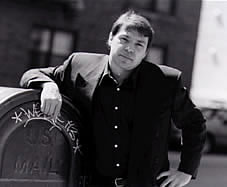What inspired you to write this book?
I was watching the news coverage when a local musician gave his account of braving the conditions in the street to see what had happened to a favorite jazz club in which he regularly played. I was so incredibly moved by his feelings for that patch of ground that the wheels of a storyline began turning in my head, eventually evolving into Miles and Pop's personal and physical journey in Hurricane Song. The courage of everyone involved, the heroic and giving nature of those who laid their lives on the line to help, and the woefully unprepared nature of our government which contributed to the danger and lawlessness so many had to endure, pushed me to take on this project about an overwhelming event that called out to the humanity in all of us.
17-year-old Miles in the Superdome—I stopped trying to figure out how scared I was or if that empty feeling in my stomach would ever quit. The sweat came down my face, stinging the corners of my mouth. Maybe it was 110-degrees. And when those flashlights disappeared and everything went dark again, it was like somebody shut the oven door on us. …Then I heard a baby cry with a shriek that nearly stopped my heart cold. And for the life of me, I didn't know if that baby was being born or dying.
Why is it important to have a young adult novel about Hurricane Katrina?
History has a way of disappearing for our teens. They get so caught up in everything it takes for them to survive today that yesterday's lessons have a way of getting shortchanged, even the immensely important ones. They need to see the roles of other teens in this event, how their courage, passion, and in some instances their greed, helped to shape what happened. And for all the young adults who personally endure this tragedy, and who are still persevering today in New Orleans and other cities, I want them they to know that what they went through is important enough to read about in their English classes.
Miles—Early Monday morning, Katrina hit for real, and nobody needed a weatherman to know it. The Superdome started shaking, like Katrina was slapping its sides with a giant open hand, over and over. … The wind and rain beat down on top of the dome, and I could feel its rhythm. It was louder than the noise from the thousands of people packed inside put together. In my head, I pictured God beating his own African drum, saying, HERE'S MY HURRICANE SONG." And you couldn't leave or close your ears to His playing. You had to stay put and listen, till He decided that He was done.
What research did you do as you were writing?
I was awe struck by the photos and news accounts, especially those from the Superdome. Many of those early images and interviews became scenes in the novel. These included the report of a man throwing himself off the upper deck of the Superdome, kids playfully tossing a football on the field, the doctors and nurses who rendered aid there, the gangs and thugs who tried to bully people, those who preformed selfless acts of sharing, and the Soul Patrol who helped avoid conflicts in the street. As time went on, I was able to view on-line diaries, and then interview people who were victims of the storm and those who went to New Orleans to offer help. After spending six years on Rikers Island teaching teens to read and write, and being locked down in a number of violent instances there, I was able to use my personal experiences in relating to the moments of lawlessness in the Superdome and on the streets.
Miles and Pop—We walked past that row of stores where the gunshots had come from. Only we were moving slow and cautious, like we were coming up on a hornet's nest. People were running in and out of the different stores with their arms full of stolen stuff. …Lots of them were carrying out milk, bread, and other things to feed their family… "I can't stomach what some of these bandits are making off with," said Pop. ‘Except for the food it ain't nothin' but stealing." Some people had their arms wrapped around TVs, or were rolling out shopping carts filled with radios, rugs, and cartons of car wax. "It's everybody's store now!" crowed a guy, carrying away a whole metal shelf stacked with CDs and Videos.
Did you set yourself any ground rules in this novel?
As with my other young adult novels, I didn't want to pull any punches. I didn't want to back away from any of the important social issues that Katrina emphasized in our society, such as racial injustice and the plight of those with fewer economic resources. Issues that continue to reverberate today in the storm's aftermath.
Miles and ‘Fess (an aging jazz musician whose house in New Orleans was destroyed)— In the first two weeks we were back, ‘Fess got four offers from big investment companies to but his property, even though Katrina had ripped the house on it to shreds. "Of course, they want to buy," raged ‘Fess. "They wanna buy us all out. Pick up every plot of land they can from black folks while we're still tryin' to figure out which way's up. They'll try to get it for a song—whole blocks of blown down houses. Then build it up for strip malls, luxury condos, or new hotels. Pretty soon there won't be any black faces livin' here. We won't be able to afford it. And that's what they want. Believe me."
|

